- Home
- David Liss
A Spectacle of Corruption Page 2
A Spectacle of Corruption Read online
Page 2
There was never a poor opportunity to enhance one’s reputation, I thought. Wild intended to see me hang and get a few puffs in the newspapers at the same time.
“Then you think yourself privy to the criminal doings in our metropolis?” Antsy asked.
“I have applied myself to this trade for many years now,” Wild answered. “There are few matters of criminality that escape my notice.”
He neglected to mention that he noticed these matters of criminality because, in general, he or his agents orchestrated them.
“Tell us, if you will,” Antsy said, “of Mr. Weaver’s connection to the death of Walter Yate.”
Wild paused for a moment. I glared at him. I did my utmost to say with silent words that he must know I would never be convicted, and if he crossed me in this I would not let the matter go. Proceed, I told him with my eyes, and you will be proceeding toward your own doom. Wild met my stare for a moment and nodded ever so slightly, conveying a significance I could not fathom. He then turned to Antsy.
“I can tell you almost nothing of that,” he said.
Antsy opened his mouth, but it seemed to take him a moment to realize the answer he received was not the one he had been anticipating. He pressed the bridge of his nose with his thumb and forefinger, as though trying to squeeze Wild’s answer from his flesh the way a cider maker wrings juice from an apple. “What do you mean, sir?” he asked, in a quivering voice more shrill than its usual.
Wild smiled slightly. “Only that I have no knowledge of the matters surrounding Yate’s death or of Weaver’s supposed involvement—only what I have read in the newspapers. It is my goal to discover the truth behind all horrific crimes, but I cannot learn everything. Though I do try, I promise you.”
Every spectator at the King’s Bench could see from the slackening of Antsy’s face that the lawyer had expected something quite different from Wild. A lecture on the danger I posed to London, perhaps. A recounting of my former crimes. A list of atrocities in which he had long suspected my involvement. But Wild had a different game in mind—one that baffled me entirely.
Antsy looked up and grimaced. He took a deep breath that puffed out his chest nearly to the size of a normal man’s and gritted his teeth into a deathly smile. “Do you not think Weaver a vicious man, quite capable of killing anyone, even a total stranger, without cause? And, accordingly, quite capable of killing Walter Yate? Is it not correct to say that you know with certainty that he did kill Walter Yate?”
“On the contrary,” Wild answered blithely, like an anatomy instructor asked to discuss the mysteries of respiration. “I believe Weaver to be a man of honor. He and I are not friends; in truth, we often find ourselves opposed. If I may be so bold, I think Weaver to be a rather miserable sort of thieftaker, who does the state and those who pay him a disservice. But being miserable in his trade does not make him necessarily a wicked man any more than a cobbler should be called wicked for making pinching shoes. I have no more reason to think Weaver guilty of this crime than I do any other man. To my knowing, you might be as guilty as he.”
Antsy spun toward the judge, Piers Rowley, who stared at Wild with an astonishment equal to the lawyer’s. “M’lord,” Antsy complained, “this is not the testimony I had expected. Mr. Wild was to have spoken of Weaver’s crimes and cruelties.”
The judge turned to the witness. Like Antsy, he was well into his later years, but with his large face and ruddy complexion he wore his age far more comfortably than the lawyer. Antsy appeared starved for all nourishment, but the judge looked to receive more than his share. His enormous jowls were big with beer and roast beef and puffed like a fat infant’s.
“Mr. Wild,” Rowley said to the witness, “you will provide Mr. Antsy with the testimony he wishes.”
I had not quite expected this reply. I did not know him well by any means, but I had observed Rowley in the past—when called to testify against men I had helped bring to justice—and I had always found in him as much fairness and honesty as one could hope for in a man of his profession. He took bribes sparingly, and then only to secure a ruling he had intended to make without financial incentive. I had ever noted that he took his role as protector of the defendant seriously, and I had felt a measure of relief when I learned he was to preside over my trial. Now it appeared that my optimism had been misplaced.
“Begging your pardon, m’lord,” Wild answered, “but I cannot answer for his expectations. Having sworn an oath to speak the truth, I must do so.”
Here was something comical. Wild had no more loyalty to oaths than a Frenchman does to clean linen. Still, he sat there, incurring the anger of the prosecuting lawyer and the judge, rather than speak ill of me. Wild, who spent far more time in the courts than I, surely knew Rowley’s temperament. He could not but have known that the judge was a man who held himself with more than his share of gravity and would not let an insult to his authority pass lightly. By defending me as he did, Wild risked great injury to himself and his trade, for he must now expose himself to Rowley’s hostility during future trials. As perjuring himself was among his most important sources of income, an adversarial judge could make his life most uncomfortable.
Antsy understood the situation no better than I. He brushed the rain off his face. “Given his reluctance to speak the truth, I have nothing more to hear from this witness,” the old lawyer said. “You may go, Mr. Wild.”
I rose to my feet. “Begging your pardon, m’lord, but I have not yet had a chance to cross-examine.”
“No more questions to this witness.” Rowley banged his gavel.
Wild stepped down and winked in my direction. I only stared blankly in return.
My pretty yellow-haired admirer wept into the sleeve of her coat, and she was not alone in her dismay. The spectators quickly answered with catcalls and hisses, and a few apple cores flew toward us. I was not such a popular figure with the mob that they would brook no insult to me, but they knew injustice when they saw it, and no rabble of this city will stand idly by while a fellow is mistreated by the law. Not in those days, when there was such little work to be had and bread was so dear. Rowley, however, had years of experience with such outbursts, and he banged his gavel once more, this time with an authority that brought down a veil of silence.
I was not so easily calmed. In our system of law, a defendant does not have a lawyer because it is presumed that the judge will act as his advocate. Often as not, however, a defendant finds himself with an unkind judge and thus with no protection whatsoever. I had never before had cause to lament the inequities of this system, for I was used to being in the position of wishing to see men convicted, that I might collect a bounty—and see justice served, of course. But now I found I could not call my own witnesses, question as I liked, or defend myself adequately. Judge Piers Rowley, a man I knew only from a distance, seemed intent upon destroying me.
Antsy next called Spirit Spicer, a fellow of whom I had never heard—how should I forget so colorful a name? He was young, only a working lad, and clearly of the lower ranks. Spicer had dressed himself to the best of his ability, but his blouse was torn in several places and his breeches stained in a way that any man of a respectable station would find embarrassing, to say the least. He had cut his hair short for the trial, using, I would suspect, a dull blade, and he looked as though he had caught his head in a grain mill.
Through a needlessly protracted line of questioning (no doubt to help him regain his sense of order after the unfortunate business with Wild), Antsy revealed that Spicer had been upon the quays in Wapping the day of Yate’s death and claimed to have witnessed the mayhem of that afternoon and the murder itself. “I saw that man there,” Spicer said, pointing to me. “He killed the fellow, Yate. He struck him, he did. And then he killed him. By striking him.”
“You are sure of this?” Antsy asked. His voice rang with triumph. His witness spoke as he wished. The rain had now let up somewhat. All was well in the world.
“I have never been so sure of v
ery many things in some long while,” Spicer assured him. “Weaver done it. That’s for certain. I was close enough to see everything, and to hear it too. I heard what Weaver said before he done it. Heard his malicious and damning words, I did.”
The old lawyer squinted in evident confusion but proceeded all the same. “And what did Mr. Weaver say?”
“He said, ‘This is what happens to those who anger the man they call Johnson.’ That’s what he said. Clear as day. Johnson. That’s the name he said.”
I had no notion of who this Johnson was and neither, apparently, did Antsy. He opened his mouth to say something but then thought better of it and turned away, announcing that he had no more questions as he took his seat.
“Johnson,” Spicer repeated.
Judge Rowley turned to me. “Mr. Weaver, would you care to ask the witness a question or two?”
“I’m delighted to learn that Mr. Spicer is on the list of witnesses that I may, indeed, question,” I said. I regretted my words the instant I spoke them, but they drew a laugh from the gallery, and I took some comfort in that. Rowley had shown himself biased against me, but I was still foolish enough to believe his position would soon change. During my week in prison, I had been given little opportunity to inquire into Yate’s death, but I had sent my good friend Elias Gordon about town, asking questions for me, and I was fully confident that what we had discovered would soon end this farce.
I glanced over to the part of the galleries where Elias sat, and he nodded eagerly, his thin face flushed with pleasure. It was time to strike a fatal blow against this disgrace to justice.
I rose from my seat, brushed the ice off my coat, and approached the witness. “Tell me, Mr. Spicer. Have you ever met a man named Arthur Groston?”
Perhaps I anticipated that Spirit Spicer would blush or blanch or tremble. He might bear down and deny knowing Groston, in which case I would have to badger him until he confessed. But Spicer thought neither to resist nor, if his face was any indication of his heart, feel a jot of shame. For all the world, his easy and open grin suggested a fellow interested only in pleasing anyone who might be so kind as to ask him a question or two. “Aye, I’ve met Mr. Groston. More than once.”
The ease of this admission disoriented me, but I pressed on all the same. “In your time of knowing Mr. Groston, has he ever offered you any money to perform a service?”
“Aye, he has done so. Mr. Groston is extreme generous, he is, and he makes a point to look after me, on account of his cousin being a friend of my mother’s, sir. He believes in looking after family, sir, as does my family, which is why he helped me out.”
I smiled at the fellow. We were all friends here. “How would you describe the service that Mr. Groston asks of you?”
“I would describe it as generous and kind,” Spicer said. Here the crowd laughed and Spicer grinned broadly, imagining himself the mob’s darling rather than its clown.
“Allow me to ask that question another way,” I said.
Antsy rose slowly to his feet. “M’lord, Mr. Weaver is wasting the court’s time with this witness. I move you dismiss him.”
Rowley spent an instant considering Antsy’s request, and I believe he would have complied, but the crowd, sensing a bias, began to hiss. It began softly but soon swelled, so that the King’s Bench sounded as though it were a court of serpents. No apple cores this time; perhaps that was what agitated the judge. The noise held the menace of a storm not yet broke. Unwilling to risk a riot, Rowley said I might continue but advised that I cease my leisurely approach, for there were other men awaiting trial this day.
I began again. “Let me be plain,” I said to Spicer, “that the judge may not grow restless. Does Mr. Groston ever, to your knowledge, pay people to testify at trials?”
“For certain. He is an evidence broker. What else should he do?”
I smiled. “And did Arthur Groston provide you with money to say that you had seen me strike and kill Walter Yate?”
“Yes, sir,” Spicer said, nodding eagerly. “He paid me before to say suchlike things on suchlike occasions as this one, but he never before paid so much as the half crown he give me for saying as I done just now.”
The spectators murmured loudly. Here was drama they had never expected. In an instant I had completely devastated the prosecution. My aunt and uncle took each other’s hands and nodded in triumph. Elias strained in his seat to avoid standing and taking a bow, for it was his dedication that had led us to this bit of knowledge. The woman with the yellow hair clapped her hands together with joy.
“So.” I looked to the jury box, meeting the gaze of each man. “Do you now tell us, Mr. Spicer, that you never actually saw me harm Walter Yate, but that you said so only because you have been paid to say so by a notorious evidence broker?”
“That’s it,” Spicer said. “That’s it on the oyster’s shell, as they say.”
I threw up my hands in mock exasperation. “Why,” I demanded, “if you have been paid to say you saw me kill Mr. Yate, do you now admit that you never saw it at all?”
Spicer took a moment to puzzle over this question. “Well,” he suggested, “I got paid to say I saw something, but I never got paid to say I didn’t see it. So long as I said I saw it, I done what I was meant to have done.”
Having spent some years performing for the public as a fighter, I knew a little about the rhythm of spectacle, so I let his words hang in the air for a moment before commencing once more. “Tell me, Mr. Spicer,” I said, after I sensed a sufficient pause, “have you never heard of perjury?”
“For certain,” he said brightly, pointing to the jury box. “That’s them right there.”
“Perjury,” I explained, once the laughter diminished, “is a crime. It is the crime of swearing to speak the truth at a trial and then knowingly speaking false. Do you not think yourself guilty of this crime?”
“Oh, no.” He waved a hand dismissively. “Mr. Groston explained it to me. He said it ain’t no more a crime than it is blasphemy for an actor to speak out against God, if he do it while playing on the stage. That’s all it is.”
My having finished with the witness, Mr. Antsy moved to question Spicer once more. “Did you see Mr. Weaver kill Walter Yate?”
“Yes, I did!” he announced cheerfully. He then looked over to me, as though waiting for me to question him so he could tell me once more that he hadn’t.
Antsy next brought out another eyewitness, a man of middle years named Clark, who also said he had seen me commit this crime. When I had the chance to examine him, he resisted a bit more than young Mr. Spicer, but he at last admitted that he had been paid by the evidence broker, Arthur Groston, to say he had seen what he had not. I had every reason to regret that the law does not permit a defendant to call witnesses, for I would have liked very much to know who paid Mr. Groston to secure this evidence. But the information I had obtained, I believed, more than answered my purposes, and there would be time enough for Groston later. The Crown had no evidence against me but two eyewitnesses, men who had admitted that they had seen nothing at all but the coin in their hands.
And so, as I gazed at the yellow-haired woman, I thought myself safe. Mr. Antsy had done his job admirably, proving that age need be no impediment to any man who maintained a youthful ambition, but the evidence against me had been exploded. Nevertheless, when it came time for the judge to direct the jury, I realized I had been overly optimistic and had put perhaps too much confidence in that phantasm called truth.
“You have heard many things,” the honorable Piers Rowley told the jury, “and many things of a contradictory nature, too. You have heard witnesses say they have seen something and then, as though a trick done by Gypsy showman, you have heard them say they had not. You must decide how best to unravel this puzzle. As I cannot tell you which way to do so, I can only say that there is, perhaps, no more reason to believe a tale refuted than a tale spoken. You cannot know if these witnesses have been paid to say they saw something or paid to say th
ey did not. I have no knowledge of evidence brokers, but I do know of villainous Jews and the tricks they will play to secure their freedom. I know that a race of liars might well pay honest coin to turn other men dishonest. I hope you will not be blinded by such petty cheats nor expose every Christian man, woman, and child in London to the ravages of a rapacious nation who might come to believe they can murder us with impunity.”
And so the jury went off to make its decision.
This august body returned not half an hour later.
“How do you find?” Judge Rowley asked.
The foreman arose slowly. He removed his hat and ran his fingers through damp and thinning hair. “We find Mr. Weaver guilty of murder, just like you said, Your Honor.” The man never once looked up.
The crowd let out a cry. I could not tell at first if it was of joy or outrage, but I soon saw to some small pleasure that the mob had taken my part. Rubbish once more took to the air. Men were on their feet in the back, shouting of injustice, popery, and absolutism.
“Have you anything to say before sentence is passed?” the judge asked me over the din. He appeared eager to press on with his business and depart as quickly as he could, without troubling himself to restore order. I must have thought on his question for an instant too long, for he banged his gavel and said, “Very well, then. Given the seriousness and cruelty of this crime, I can see no reason for leniency, not when there are so many Jews in this city. I cannot stand by and nod my approval, telling the members of your race that they may kill Christians as they see fit. I sentence you, Mr. Weaver, to be hanged for the most horrible crime of murder. This punishment shall be carried out at the next hanging day, six weeks hence.” He again banged the gavel, stood up, and exited the courtroom, flanked by a quartet of bailiffs.
In an instant a pair of these worthies were at my side to lead me back to Newgate prison. Though my death had just now been ordered, my first thoughts were not on the terrors of facing eternity but on the indignity of being carted off by these roughs.

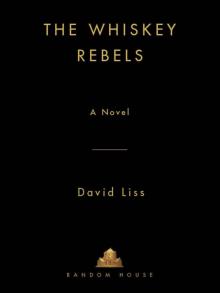 The Whiskey Rebels
The Whiskey Rebels Renegades
Renegades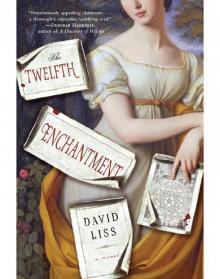 The Twelfth Enchantment: A Novel
The Twelfth Enchantment: A Novel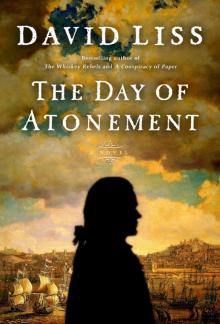 The Day of Atonement
The Day of Atonement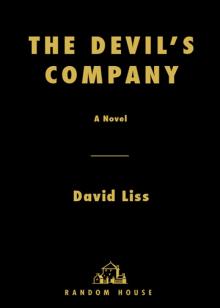 The Devil's Company
The Devil's Company Randoms
Randoms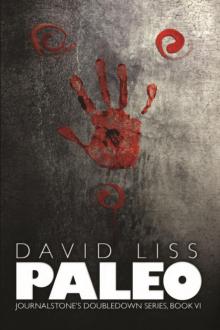 Paleo / The Doomsday Prepper
Paleo / The Doomsday Prepper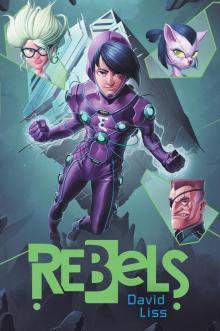 Rebels
Rebels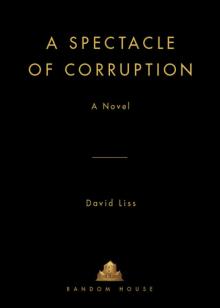 A Spectacle of Corruption
A Spectacle of Corruption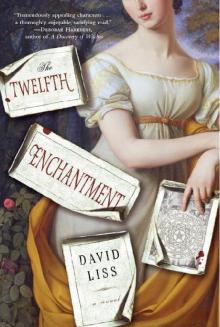 The Twelfth Enchantment
The Twelfth Enchantment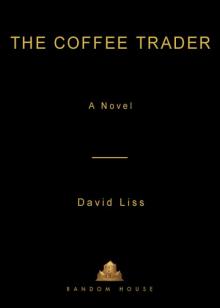 The Coffee Trader
The Coffee Trader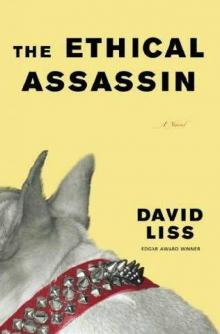 The Ethical Assassin
The Ethical Assassin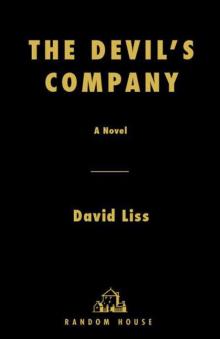 The Devil’s Company: A Novel
The Devil’s Company: A Novel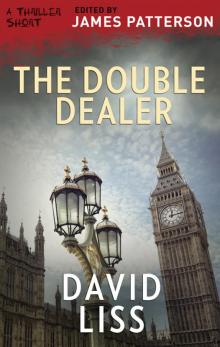 The Double Dealer
The Double Dealer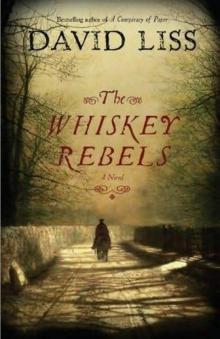 The Whiskey Rebel
The Whiskey Rebel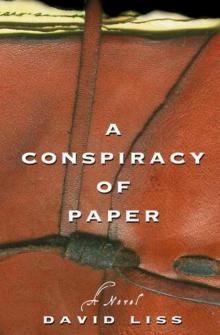 A Conspiracy of Paper bw-1
A Conspiracy of Paper bw-1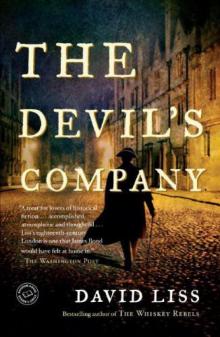 The Devil's Company bw-3
The Devil's Company bw-3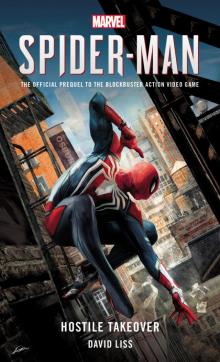 Marvel's SPIDER-MAN
Marvel's SPIDER-MAN